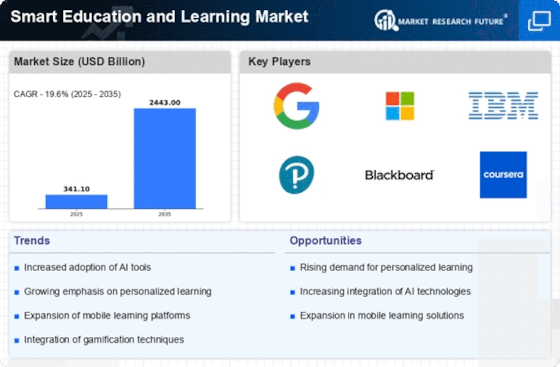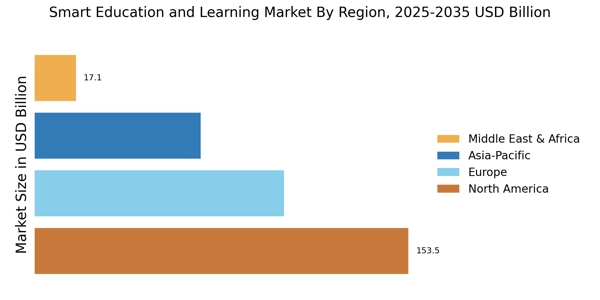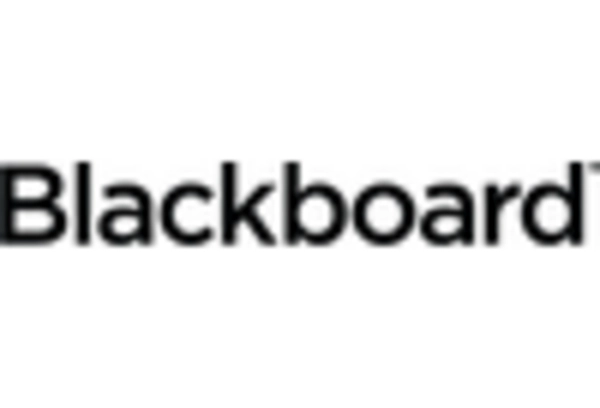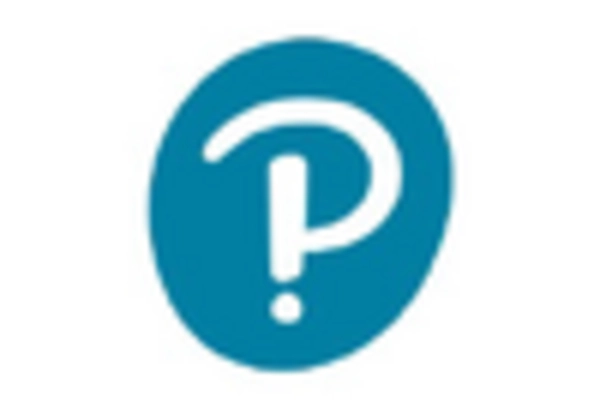Increased Investment in EdTech Startups
The Smart Education and Learning Market is experiencing a significant increase in investment directed towards EdTech startups. Investors are recognizing the potential of innovative educational technologies to transform traditional learning paradigms. In recent years, funding for EdTech ventures has surged, with estimates suggesting that investments could exceed USD 10 billion annually by 2025. This influx of capital is enabling startups to develop cutting-edge solutions that address various educational challenges, from personalized learning platforms to advanced assessment tools. As these startups emerge and scale, they contribute to the diversification of the Smart Education and Learning Market, fostering competition and innovation. This trend not only enhances the availability of educational resources but also encourages established institutions to adopt new technologies, ultimately benefiting learners worldwide.
Rise of Collaborative Learning Environments
The Smart Education and Learning Market is increasingly characterized by the rise of collaborative learning environments. These environments promote teamwork and peer-to-peer interaction, which are essential for developing critical thinking and problem-solving skills. Educational institutions are recognizing the value of collaborative learning, leading to the implementation of group projects, discussion forums, and interactive workshops. Research indicates that students engaged in collaborative learning demonstrate higher levels of engagement and retention. As a result, the market is likely to see a proliferation of tools and platforms that facilitate collaboration among students and educators. This trend reflects a broader understanding of the importance of social learning dynamics in the educational process, thereby shaping the future landscape of the Smart Education and Learning Market.
Growing Emphasis on Data-Driven Decision Making
The Smart Education and Learning Market is witnessing a growing emphasis on data-driven decision making. Educational institutions are increasingly utilizing analytics to assess student performance, identify learning gaps, and tailor educational strategies accordingly. This shift towards data-informed practices is expected to enhance the effectiveness of educational programs, leading to improved student outcomes. According to recent studies, institutions that leverage data analytics report a 15% increase in student retention rates. As a result, the demand for data analytics tools and platforms is on the rise, prompting educational providers to invest in solutions that facilitate real-time data collection and analysis. This trend not only supports personalized learning but also fosters a culture of continuous improvement within the Smart Education and Learning Market.
Technological Advancements in Educational Tools
Technological advancements are playing a pivotal role in shaping the Smart Education and Learning Market. Innovations such as augmented reality, virtual reality, and gamification are enhancing the learning experience, making it more interactive and engaging. These technologies not only capture students' attention but also facilitate deeper understanding of complex subjects. The market for educational technology is expected to reach USD 300 billion by 2025, reflecting the increasing integration of advanced tools in educational settings. As educational institutions recognize the potential of these technologies, they are more likely to invest in smart learning solutions that align with modern pedagogical practices. This trend underscores the importance of continuous innovation within the Smart Education and Learning Market, as stakeholders seek to leverage technology to improve educational outcomes.
Increased Demand for Flexible Learning Solutions
The Smart Education and Learning Market is experiencing a notable surge in demand for flexible learning solutions. This trend is largely driven by the need for educational institutions to adapt to diverse learning styles and schedules. As students increasingly seek personalized education experiences, the market is projected to grow at a compound annual growth rate of approximately 20% over the next five years. This growth is indicative of a broader shift towards learner-centric approaches, where flexibility in learning environments becomes paramount. Institutions are investing in technologies that facilitate blended learning, allowing students to engage with content both in-person and online. Consequently, the Smart Education and Learning Market is evolving to meet these demands, fostering an ecosystem that prioritizes adaptability and accessibility.

















